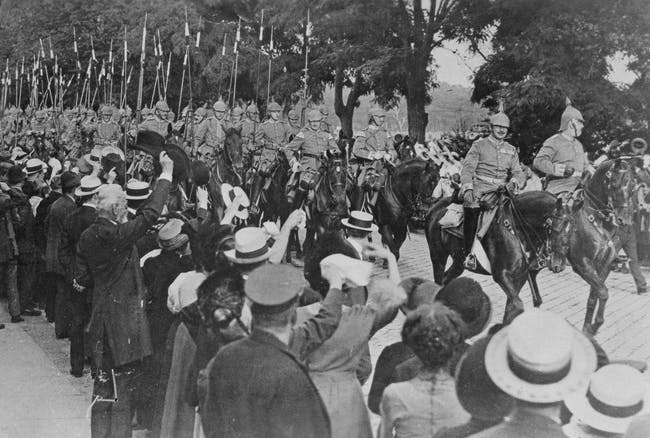The Missiles of August?
The Biden administration’s equivocation over Free China echoes the strategic ambiguity of August, 1914, when Britain failed to clarify whether it would go to war to defend Belgium and Europe stumbled into World War I.

Will America defend Free China if Beijing attacks? With missiles flying over the Strait of Taiwan after Speaker Pelosi’s visit, the question has a renewed resonance. That we don’t know the answer reminds us of an earlier moment of strategic ambiguity — August 1914. That’s when the British Empire failed to clarify whether it would go to war to defend Belgium and the Great Powers of Europe stumbled into World War I.
In 1914, Germany was threatening to engulf neutral Belgium on its way to invading France. Britain had by treaty guaranteed Belgian independence. In 1870, Prime Minister Gladstone had leapt into action at a rumor of a move against Belgium. Yet in 1914, Britain’s foreign secretary, Edward Grey, kept an ambiguous silence on Belgium. After Archduke Franz Ferdinand was killed, Grey told the French the British hoped to stay out of any war.
Only two days before the Germans were scheduled to attack did Grey warn Britain might step in to defend Belgium. That was in response to a query from Berlin’s envoy, who reported Britain appeared unready to commit. This ambiguity had fueled hopes in Germany that Britain would stand aside. Within hours of the German invasion, Grey urged Britain into the fight, citing “obligations of honor and interest as regards the Belgian Treaty.”
Might an earlier message have deterred war? The last-minute defense of Belgium astounded the German chancellor, who derided the treaty defending Belgium as a “scrap of paper.” The New York Sun, in an editorial after the German attack, saw it as evidence that “History is largely a series of treaties made and broken,” and that “A paper promise is nothing. Its sole sanction and validity is the sword.”
That point was, en passant, brought to a head by Mrs. Pelosi’s visit, but it has been festering. Shinzo Abe was, right up to his assassination, “uneasy” on this head. “While Taiwan has no allies,” the Japanese sage wrote in April in Los Angeles Times, “it does have the Taiwan Relations Act, a 1979 U.S. law requiring the United States to provide Taiwan with the military equipment and supplies” to defend itself.
This law, as Abe saw it, was “a form of compensation for America’s unwillingness to say explicitly that it will ‘defend Taiwan’ should it be attacked.” Yet the ambiguity was now “encouraging China to underestimate American resolve,” Abe wrote — especially after Russia’s Ukraine invasion. He called for America to “make clear that it will defend Taiwan against any attempted Chinese invasion.”
Far from taking this advice, the Biden administration has followed a policy out of Edward Grey’s playbook. Three times President Biden has vowed to defend Taiwan against attack, only to have his remarks countermanded by administration officials. One can only imagine the confusion this has sown at Beijing. “Two insecure superpowers are stumbling towards dangerous collision,” Yale economist Stephen Roach observes in the Financial Times.
China today, like Germany in 1914, is driven by “aspiration and anxiety,” say authors Hal Brands and Michael Beckley, in their new book, “Danger Zone.” The hazard is that such a power “gambles big to reshape the balance of power before its window closes.” They contend “the best way to avoid a looming war in Asia is to make clear that Beijing cannot win at anything like an acceptable cost.” Even the Times, in an editorial, says “clarity could help.”
“The lamps are going out all over Europe,” Grey lamented the night Germany attacked Belgium. “We shall not see them lit again in our lifetime.” Considering the destruction of World War I — millions killed, the rise of Nazism and Communism, the fall of honest money, to name a few — Britain’s blunder over Belgium ranks as one of the greatest mistakes in world history. Think of the consequences that could arise today from the Biden administration’s equivocation over Taiwan.

